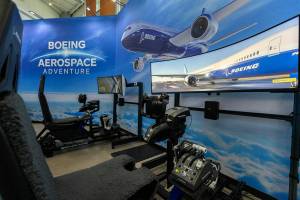United’s image takes a well-deserved hit for bullying passenger
Published 1:30 am Tuesday, April 11, 2017
By Fredrick Kunkle / The Washington Post
United lost more than a half-billion dollars in market value in response to outrage over the forcible removal of a passenger who refused to give up his seat Sunday.
And that’s after some improvement on Wall Street.
But it’s probably going to take longer for United to reclaim its reputation, especially because the more we know the worse the episode seems. And it was plenty bad: a knock-down, drag-out incident that left the passenger bloodied and delayed Sunday’s flight from Chicago’s O’Hare International Airport to Louisville. Video of the confrontation aboard Flight 3411 rocketed through social media.
For one thing, United now says the flight wasn’t overbooked, as it had initially said. Overbooking is when the airlines sell more seats than they have to compensate for possible no-shows — a practice that’s not just legal, but sensible, too. Restaurants and hotels do the same thing with reservations. Turns out the airline wanted the seats for crew members it said needed to be in Louisville on Monday.
The U.S. Department of Transportation, under its section on “Fly Rights,” spells out the rules on overbooking for airlines and passengers who have valid reservations to fly. These include the commonsense requirement that the airlines must first ask for volunteers to give up their seats, and that a passenger who is bumped must receive compensation. But the DOT leaves it up to the airlines to specify what form and how much compensation a passenger should receive. The DOT also says that if a passenger misses the check-in deadline, he might not just lose his seat; he might also forfeit the right to compensation.
But now we know that this was a flight where all the passengers who had paid for a seat, survived TSA, and reached the ticket counter and the gate on time, were seated and ready for takeoff. As paying customers, they had done their part.
It was the airline that, for whatever reason, found itself scrambling at the last minute to put four of its employees on board. In other words, the company didn’t plan ahead, apparently. And then it became intent on violating that cardinal rule of business about putting the customer first.
Unless those four United employees were also brain surgeons needed to perform emergency surgery in Louisville two hours later, United should have found another way to transport them when no passengers volunteered to surrender their seats. United’s employees could have taken the next flight. Or rented a car. In a pinch, United chief executive Oscar Munoz — who hauls in about $5.5 million a year, according to a business profile from Hoover’s Inc. — could have paid the United crew to take an Uber. Uber, which has had its own run of bad publicity, might have been willing to offer a big discount.
And now the passenger removed from the flight has taken an additional beating, too. First, Munoz — in what CNBC says was a leaked email from inside the company — blamed him for the fracas. And then it came to light that the passenger has a “troubled past,”according to some media reports.
To which we say: So what?
It’s natural to want to know more about what happened and everyone involved — including, we hope, the Chicago Department of Aviation officers who dragged the man off the plane. But unless he had a history of assaulting people, his past doesn’t change the fact that he was dragged caveman-style off a plane after he declined to volunteer his seat.
Since then, Munoz has made a turnabout. In United’s latest statement, Munoz said he would order a review of company policies.
Meanwhile, the United Airlines jokes keep coming — on Twitter, on late night, such as Jimmy Kimmel’s standup and spot-on parody of a commercial for the beleaguered airline – and no doubt MBA candidates are revising their theses on how not to deal with a public relations meltdown.
Not everybody’s laughing: D.C. Del. Eleanor Holmes Norton (D) has called for a congressional hearing into the incident.
Marketwatch reported Tuesday that shares of United Continental Holdings had fallen 3.7 percent in morning trading, or about $830 million, from its $22.5 billion market value, despite having weathered the first day of its public relations disaster fairly well. By mid-day, the airline’s stock was off only about 2.56 percent on Wall Street — or about $576 billion.
For that much money, United should have bought each of its four employees a new car.




